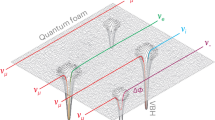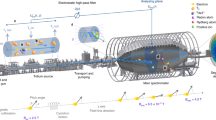Abstract
Measurements1 of the flux of neutrinos emitted as by-products of hydrogen fusion reactions in the Sun's core bear on questions ranging from stellar evolution theories2,3 to the question of the neutrino mass. Attention has been devoted recently to possible time variations in the neutrino flux data, and some investigators have found an inverse correlation with the 11-year sunspot cycle4–7, although there is still some debate about the statistical significance of this correlation8. The neutrino luminosity of the Sun is not expected to vary on timescales less than one million years, so alternative sources of neutrinos have been invoked to explain the temporal variations. Galactic cosmic rays have been considered to be a likely candidate, as their intensity at the Earth's orbit varies inversely with the activity of the Sun. Here we present a calculation of the inventory of positron emitters in the Earth's atmosphere that results from hadronic cascades initiated by galactic cosmic rays, and the variation of this source of low-energy neutrinos with the 11-year solar cycle. Our results rule out the possibility that cosmogenic neutrino emitters are responsible for an apparent solar-cycle dependence in Davis's solar neutrino experiment1. As atmospheric secondary-particle decay was previously eliminated as a significant neutrino source9, any such variations, if corroborated over the next sunspot cycle, would appear to be caused by phenomena outside the Earth's atmosphere, most likely in the Sun itself.
This is a preview of subscription content, access via your institution
Access options
Subscribe to this journal
Receive 51 print issues and online access
$199.00 per year
only $3.90 per issue
Buy this article
- Purchase on Springer Link
- Instant access to full article PDF
Prices may be subject to local taxes which are calculated during checkout
Similar content being viewed by others
References
1. Rowley, J. K., Cleveland, B. T. & Davis, R. Jr in Solar Neutrinos and Neutrino Astronomy (eds Cherry, M. L., Fowler, W. A. & Lande, K.) Conf. Proc. no. 126, 1-21 (Am. Inst. Phys., New York, 1985). 2. Bahcall, J. N. Rev. mod. Phys. 50, 881-903 (1978). 3. Bahcall, J. N. in Solar Neutrinos and Neutrino Astronomy (eds Cherry, M. L., Fowler, W. A. & Lande, K.) Conf. Proc. no. 126, 60-68 (Am. Inst. Phys., New York, 1985). 4. Davis, R. Jr in Proc. Seventh Workshop on Grand Unification, ICOBAN'86 (Toyama, Japan, in the press). 5. Davis, R. Jr Proc. 13th Texas Symp. Relativ. Astrophys. (Chicago, in the press). 6. Raychaudhuri, P. Solar Phys. 93, 397-401 (1984). 7. Bazilevskaya, G., Stozhkov, Y. I. & Charabhchiyan, T. N. J. exp. theor. Phvs. Lett. 35, 341-343 (1982). 8. Bahcall, J. N., Field, G. B. & Press, W. H. Astrophys. J. Lett. 320, L69-L73 (1987). 9. Gaisser T. K. & Stanev, T. in Solar Neutrinos and Neutrino Astronomy (eds Cherry, M. L., Fowler, W. A. & Lande, K.) Conf. Proc. no. 126, 276-281 (American Institute of Physics, New York, 1985). 10. O'Brien, K. /. geophys. Res. 84, 423-431 (1979). 11. O'Brien, K. & de la Zerda, A. Trans. Am. nucl. Soc. 46, 641-643 (1984). 12. O'Brien K. & de P. Burke, G. J. geophys. Res. 78, 3013-3019 (1973). 13. O'Brien, K. Nuovo dm. A3, 521-547 (1971). 14. Rudstam, G. Z. Naturf. A21, 1027-1041 (1966). 15. Bethe, H. A. Phys. Rev. Lett. 56, 1305-1308 (1986).
Author information
Authors and Affiliations
Rights and permissions
About this article
Cite this article
de la Zerda Lerner, A., O'Brien, K. Atmospheric radioactivity and variations in the solar neutrino flux. Nature 330, 353–354 (1987). https://doi.org/10.1038/330353a0
Received:
Accepted:
Issue Date:
DOI: https://doi.org/10.1038/330353a0
Comments
By submitting a comment you agree to abide by our Terms and Community Guidelines. If you find something abusive or that does not comply with our terms or guidelines please flag it as inappropriate.



